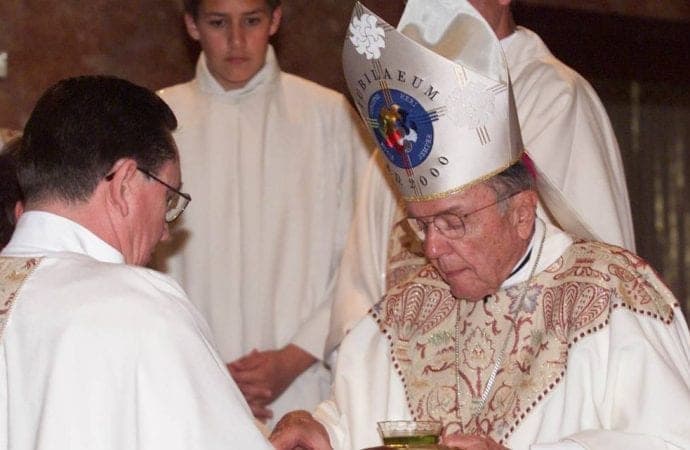NEW YORK — The diocese of Cheyenne, Wyoming announced on Tuesday that it has substantiated three new allegations of abuse against retired Bishop Joseph Hart who could soon become the first U.S. bishop to face criminal prosecution for sexual abuse.
The diocese has previously investigated the cases of three other individuals, which were deemed credible and substantiated, bringing the total number of Cheyenne victims who have come forward to six.
“The allegations have been reported to the civil authorities, and the Diocese of Cheyenne has cooperated fully with the police,” the diocese said in a statement on Tuesday.
The diocese said Hart had declined to be interviewed in its review of the new cases, which they had been given authorization by the Holy See to conduct prior to the United States Conference of Catholic Bishops (USCCB) passing new directives for bishop accountability measures.
Results from the latest investigation have been sent to the Vatican’s Congregation for the Doctrine of the Faith (CDF), the release confirmed.
Hart’s ecclesiastical career spanned nearly three decades in Cheyenne, where he was first made an auxiliary bishop in 1976. He led the diocese from 1978 until his retirement in 2001.
RELATED: Cheyenne diocese struggles with abuse revelations about popular bishop
Prior to being named a bishop, Hart had served as a priest in the Diocese of Kansas City-St. Joseph for two decades following ordination in 1956.
The Diocese of Kansas City-St. Joseph has already settled 10 cases of abuse against Hart.
In two settlements alone – one in 2008 and another in 2014 – the diocese has paid out nearly $20 million dollars to more than 50 plaintiffs in cases that included Hart among other priests of the diocese.
In a statement on Tuesday, Bishop Steven Biegler praised the victims for coming forward and pledged the Church’s support in their healing.
“I applaud the victims who have come forward to report sexual abuse to the police or the Church. Your courageous action helps us to address these terrible crimes, and your example encourages other victims to find their voice,” he said. “As the Church, we promise to protect the most vulnerable and to accompany those who have been harmed on a journey of healing.”
Biegler was named bishop of Cheyenne in 2017 and upon arriving re-opened an investigation into Hart.
In July 2018, the diocese announced it had found two allegations against Hart “credible and substantiated” and also said it was cooperating with the local police in a new criminal investigation into Hart, as Wyoming has no statute of limitations for criminal cases.
RELATED: Case of Bishop Hart shows role clericalism plays in abuse cover-up
In June, the diocese announced that the Vatican had greenlighted a canonical penal process against Hart. If he is found guilty, he could be stripped of his title of bishop and removed from the priesthood.
In August, Cheyenne’s police department recommended that charges be brought against a member of the Wyoming Catholic clergy – and another person “seeking membership” in the clergy – of abuse during the 1970s and 1980s.
While state law prevents the suspects from being identified, a press release said the investigation “stems from a case initiated in 2002 that was reopened in 2018 when new information was produced and provided to the Cheyenne Police Department by an independent investigation conducted by the Wyoming Diocese of the Catholic Church.”
The subject of that 2002 investigation was Hart.
As Hart faces both criminal and church investigations, victims have expressed concerns that he could die before either process is completed. In a three-part investigative series by Crux last month, one victim from Cheyenne said that “I want him to face a reckoning from the very institution that protected him all these years.”
Hart will turn 88 later this month and continues to reside in a private residence in Cheyenne.
Follow Christopher White on Twitter: @cwwhite212
Crux is dedicated to smart, wired and independent reporting on the Vatican and worldwide Catholic Church. That kind of reporting doesn’t come cheap, and we need your support. You can help Crux by giving a small amount monthly, or with a onetime gift. Please remember, Crux is a for-profit organization, so contributions are not tax-deductible.













